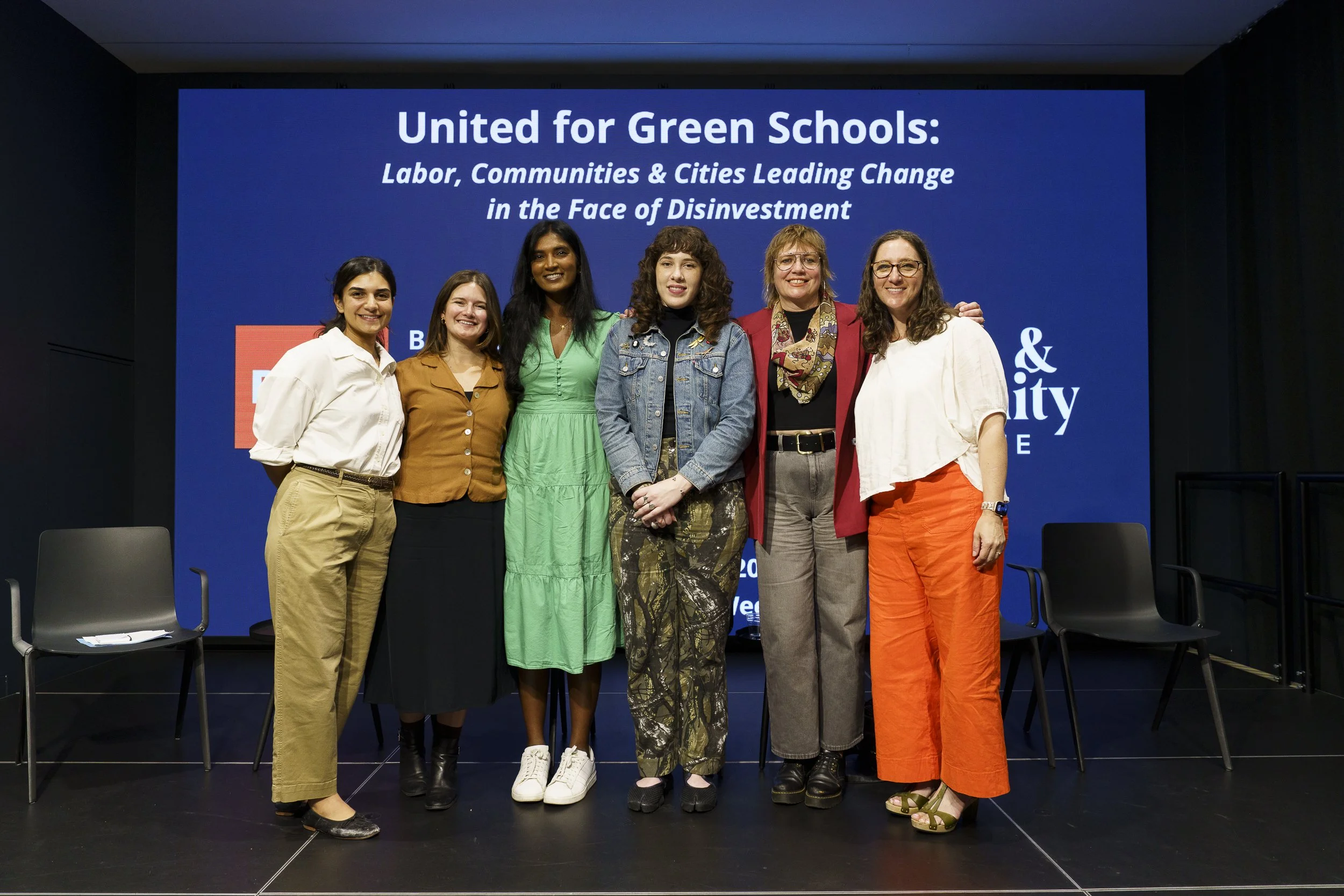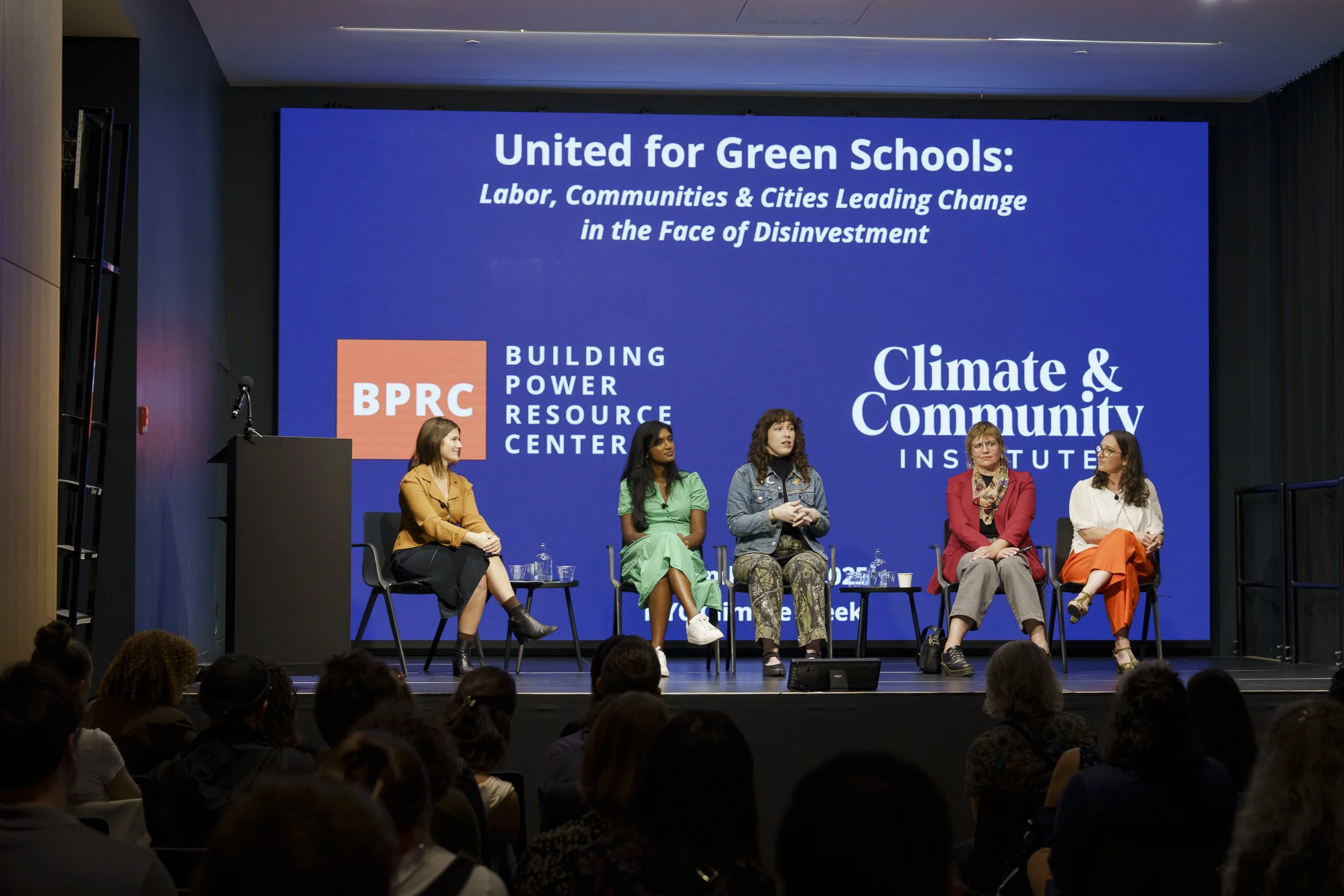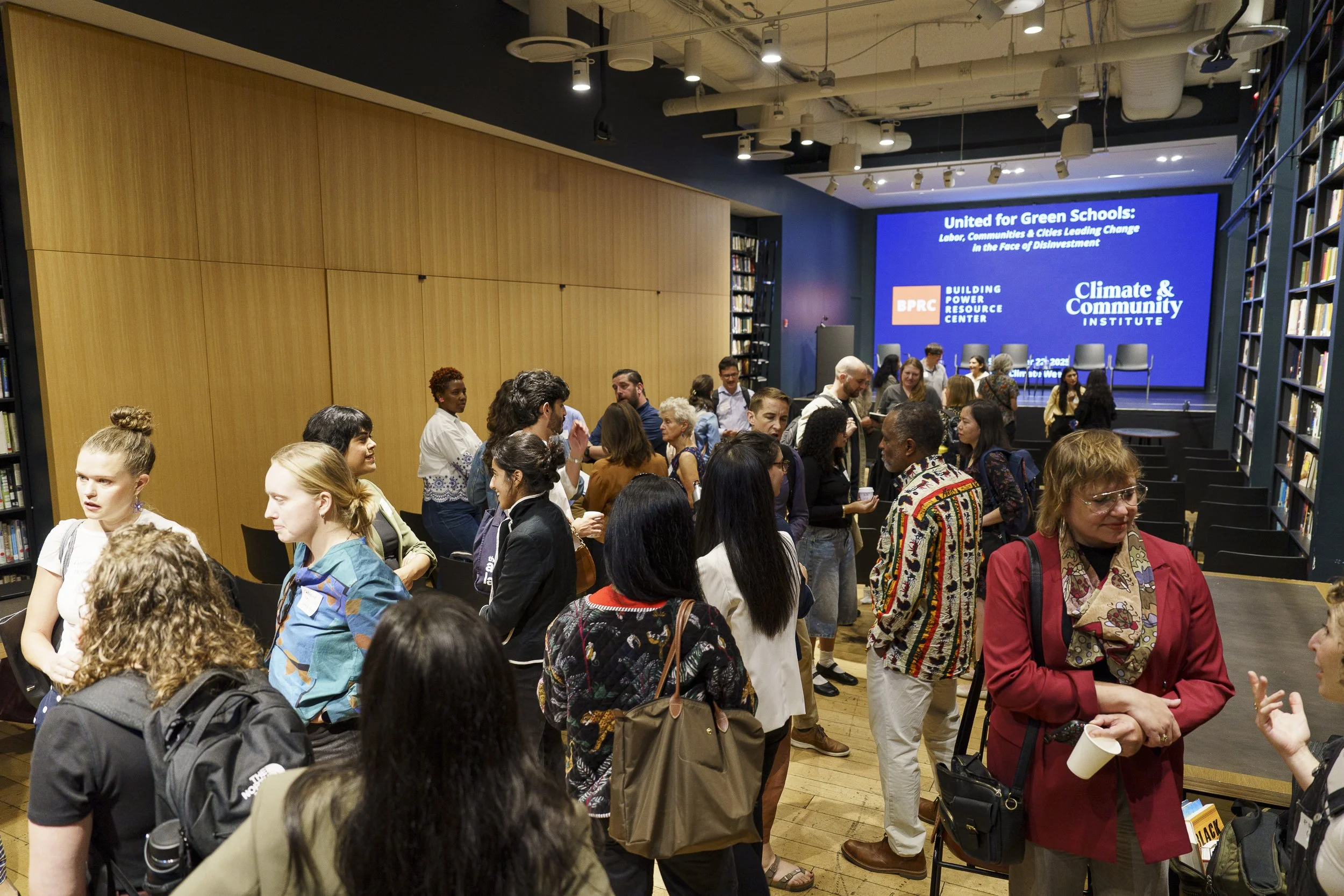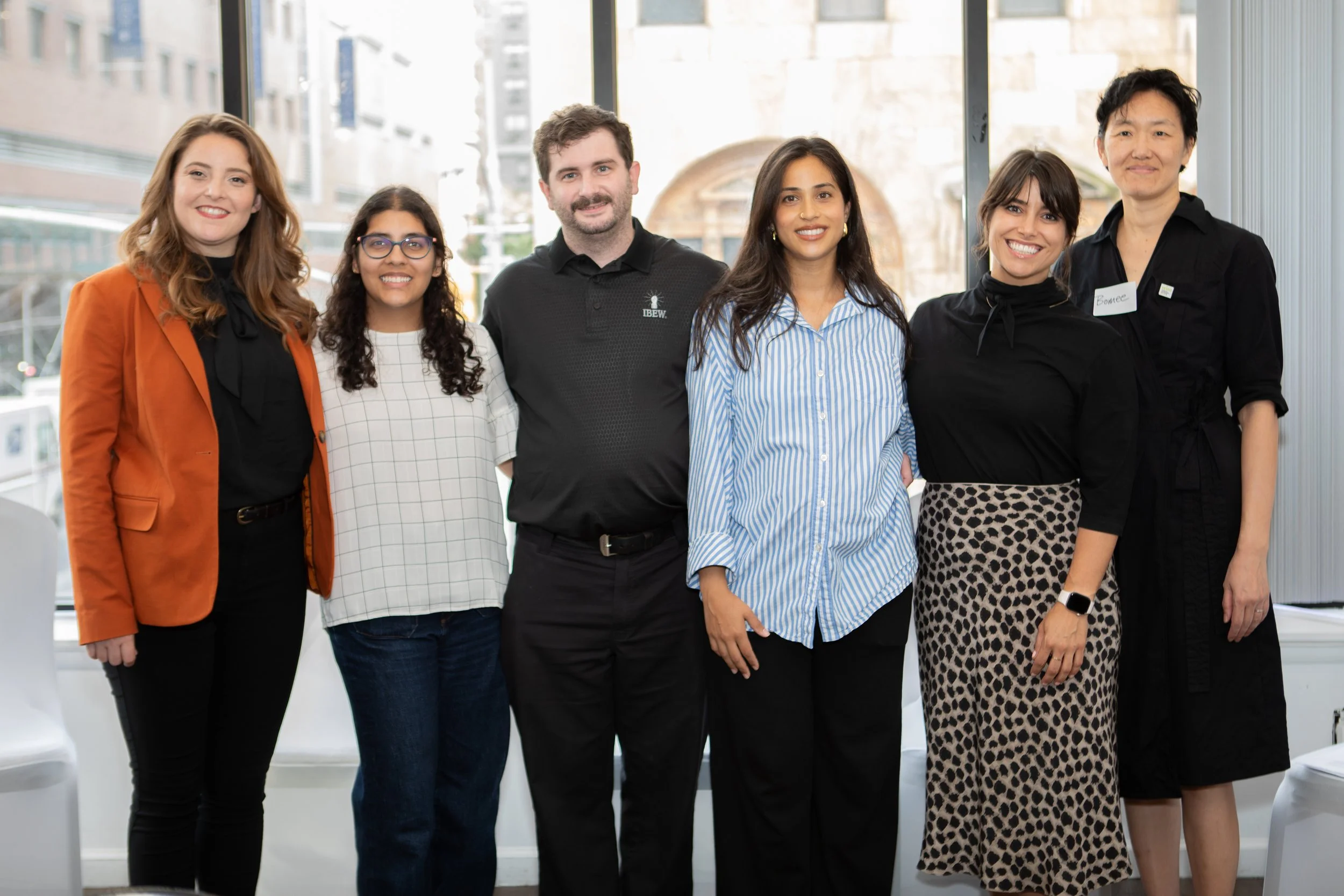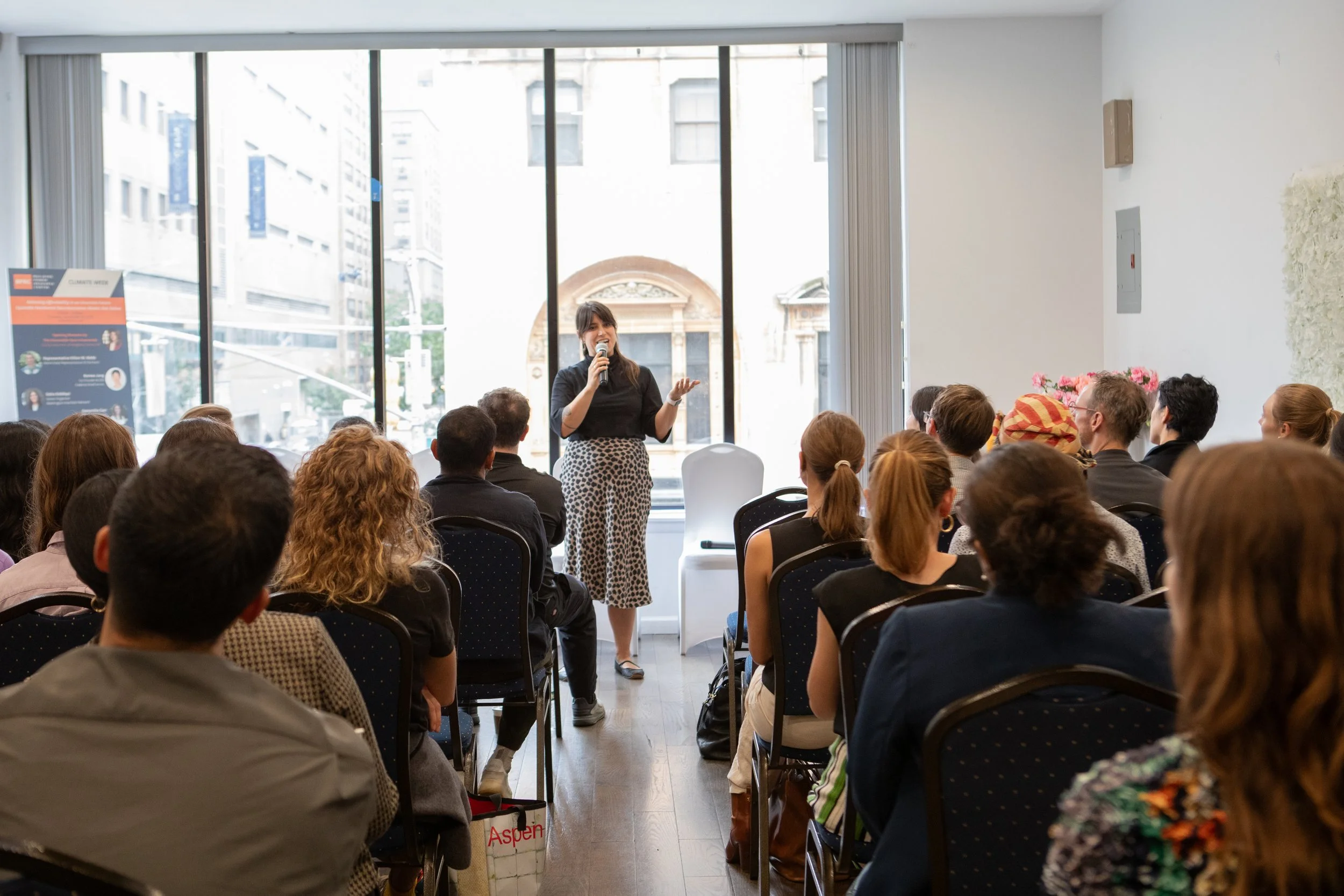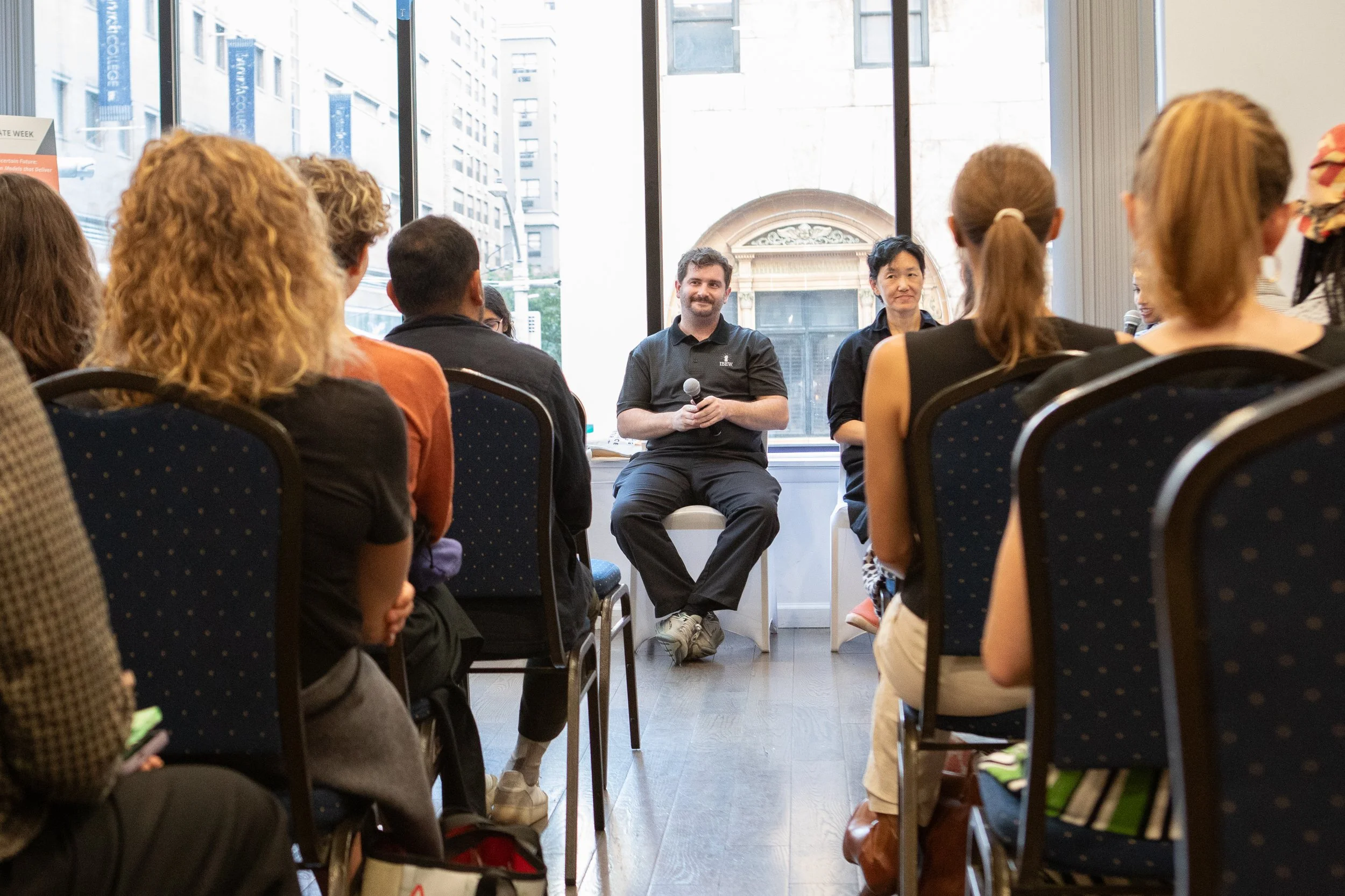Climate Week 2025
BPRC showcased how community groups and local governments are providing real leadership, despite uncertainties and federal disinvestment.
United for Green Schools: Labor, Communities & Cities Leading Change in the Face of Disinvestment
Co-hosted by Climate & Community Institute
Labor, community, and government coalitions are fighting for–and winning–transformative investments in green, healthy schools, despite the challenging times that public schools face today.
Public schools face chronic disinvestment, enrollment crises, and a backlog of deferred maintenance. Investing in green, healthy schools saves districts money, improves learning and work conditions within schools, and trains students for good jobs in the clean energy economy.
Our speakers traveled from Columbus, Los Angeles, and Chicago and represented perspectives from teachers unions, a community organization, and a school district board member. The room buzzed with energy as each panelist kicked-off the discussion with a recent victory, then described the nuts and bolts of how they are winning and implementing green schools programs in their districts. Other community groups and teachers unions in the audience were inspired by the discussion, and approached panelists about how to replicate the work in their community!
Anusha Thotakura, Chicago School Board Member, talked about the inside-outside collaboration behind a recent victory. Anusha said, “When I was campaigning (for school board), the number one issue that families across the district talked about was the condition of our buildings… I am really proud to be ‘CTU’s governing partner’ to have carried forward a resolution that passed this June that requires the district to invest in 12 green pilot projects- that invests in rooftop solar projects and geothermal projects, that creates a revolving fund so that any tax credits and incentives will be put aside to be used for mold, lead, and asbestos removal. It also invests in career and technical education programming for our students… All of this was co-designed and collaborated with CTU and the larger coalition, and it passed unanimously.
Lauren Bianchi, Green Schools Organizer at Chicago Teachers Union discussed how their campaign is bringing hope during dark times. Lauren said, "A lot of the teenagers I taught had very little hope about the world they are inheriting… our work in Chicago makes people think we can fight not just to stop bad things, but we can win things that will benefit us, our family members and future generations. These green populist demands really do address the biggest challenges facing our communities.”
Julie Van Winkle, Vice President of UTLA AFT shared how they are building relationships with the building trades so that the work they are advocating for can be done with union jobs. Julie said, “Something I learned doing this work is that there aren’t new types of jobs being developed, but existing careers are being modernized so that it’s a part of the green economy, such as electricians. This has made me advocate for better pathways in high schools for students to become proficient in the trades and get into union apprenticeships immediately after graduation– and parents are interested in learning about this too so that their kids have more options after they graduate.”
Tara Polansky, Lead Climate Organizer with Ohio Organizing Collaborative talked about their plans for building their power and how they are leveraging the assets they built through their Columbus campaign. Tara said, “In the next year, we want to move from just having groups in Columbus to having 100 groups around the state organizing for public schools… Emerging groups in two school districts have already asked what they can do in their districts. There are a lot of opportunities in districts where they are building new schools and we’ll now be able to lean on the assets of our leaders; our school board can talk to other school board members across the State and now our CFO is an expert in this and can talk to other CFOs; BPRC is a tremendous asset with all the technical know-how. And all our learnings about the inside-outside strategy to guide people to do that in a way that is less staff intensive too.” Tara also contributed to this post on their campaign’s site.
Achieving Affordability in an Uncertain Future: Equitable Residential Decarbonization Models that Deliver
Leaders are increasingly questioning whether residential building decarbonization and affordability can coexist—or if they are fundamentally at odds. Equitable residential decarbonization and electrification is especially challenging; and right now, scalable models are essential. This includes reliable funding sources, which are under pressure as states and municipalities face uncertain financial futures.
At this sold-out event, our speakers from Allegheny County PA, Richmond CA, New York City, Washington DC, and Maine shared their model for decarbonizing homes at-scale. They discussed the importance of an inside-outside approach to policy implementation, the power of public entities (like public housing authorities) to spur innovation and reshape markets, and the real-life impact of their programs and projects on the lives of tenants and homeowners.
The models:
Mobile Home Park organizing and heat pump conversions using union labor in Maine to save residents on monthly utility costs and keep rents affordable.
Affordable Housing electrification and efficiency in NYC for multifamily buildings.
Aggregated residential electrification and solar in DC to keep long-term residents in their homes and zero their utility bills.
Neighborhood-scale decarbonization in Richmond, CA for low-income residents in partnership with labor.
The Honorable Sara Innamorato, Allegheny County Executive, provided welcome remarks about how effective state policies can be the model for other states and for federal policy. She said, “The reason we were able to secure $125 million and secure this program [Whole Home Repairs] across the finish line is because we built a diverse coalition that included contractors and energy efficiency professions, philanthropic and faith and community organizations. We keep that money locally because you cannot outsource home repair. We have had a big win and helped hundreds of homeowners take advantage of it in Allegheny County; it’s now been adopted by other states and is being pushed federally.”
Representative Kilton M. Webb, Maine State Representative talked about how the campaign to sign up mobile park residents into their state-sponsored heat-pump program is not only saving residents money immediately on their heating costs, but how it’s opening the doors to discuss other issues around affordability, “I am hearing some true horror stories in mobile home parks… These parks are being bought up by private equity groups and are increasing the lot fees with no added benefits to community members. So being able to build an organized community around one issue and transitioning that energy to other issues has been so effective.”
Bomee Jung, Co-Founder & CEO of Cadence OneFive Inc., discussed the unique power of large public entities in market transformation. Bomee said, “NYCHA is uniquely large; the largest housing authority with 176,000 units, 600 residents, 2600 boiler rooms… was using their portfolio as a way of pushing the construction market… They issued a competition with the New York Power Authority… The powerful thing is that there were no cold climate heat pumps that were installable through the windows where it only takes 40 minutes to install. This product did not exist…. NYCHA being able to commit to a volume purchase to enable that kind of transformation is really important.
Sidra Siddiqui, Community Organizer of Washington Interfaith Network, talked about how her organization responded to the communities’ top issues, around affordability and keeping their homes, to pass and implement a program that is electrifying low-income homes in the District, zeroing out residents’ utility bills, and improving indoor air quality. She also discussed the importance of community groups staying engaged throughout the policy implementation process. Sidra said, “we’ve been redefining what co-governance means for us as a community based organization, and a lot of that is also because of our work with BPRC. Government agencies are not used to advocates staying through to the implementation stage… But we’ve been intentional about staying engaged and we’ve been able to push for tweaks to the program. For example, we organized to have the Department of Energy and Environment [program implementers] agree with us that any multi-family property that goes through the program also has to agree to a 5 year rent cap.”
Samantha Carr, Environmental Manager of City of Richmond, CA, discussed how from her perspective as a City staffer, collaboration with community groups and others is critical to moving a vision project such as neighborhood-scale decarbonization. She said, “This work can’t get done without collaborative partnerships with community members, community-based organizations, the local unions, utility providers, council members, and department heads… I really enjoyed the opportunity to work on a federal grant with this coalition to figure out how to equitably transition a full city block to be fully electric and decommission the gas pipeline.”

